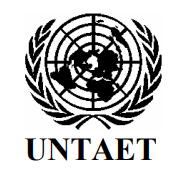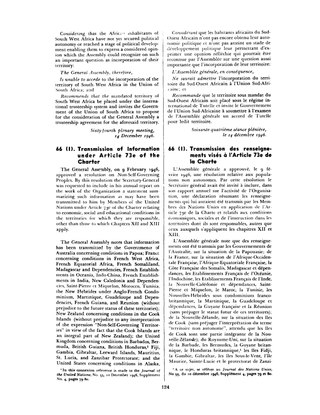
United Nations Security Council Resolution 242 (S/RES/242) was adopted unanimously by the UN Security Council on November 22, 1967, in the aftermath of the Six-Day War. It was adopted under Chapter VI of the UN Charter. The resolution was sponsored by British ambassador Lord Caradon and was one of five drafts under consideration.

The United Nations Transitional Administration in East Timor (UNTAET),, was a United Nations mission in East Timor that aimed to solve the decades-long East Timorese crisis in the area occupied by Indonesian military. UNTAET provided an interim civil administration and a peacekeeping mission in the territory of East Timor, from its establishment on 25 October 1999, until its independence on 20 May 2002, following the outcome of the East Timor Special Autonomy Referendum. The transitional administration was established by United Nations Security Council Resolution 1272 in 1999.

East Timor, officially the Democratic Republic of Timor-Leste, is a country in Southeast Asia and Oceania. The country comprises the eastern half of the island of Timor and the nearby islands of Atauro and Jaco. The first inhabitants are thought to be descendant of Australoid and Melanesian peoples. The Portuguese began to trade with Timor by the early 16th century and colonised it throughout the mid-century. Skirmishing with the Dutch in the region eventually resulted in an 1859 treaty for which Portugal ceded the western half of the island. Imperial Japan occupied East Timor during World War II, but Portugal resumed colonial authority after the Japanese surrender.

Chapter XI of the United Nations Charter defines a non-self-governing territory (NSGT) as a territory "whose people have not yet attained a full measure of self-government". Chapter XI of the UN Charter also includes a "Declaration on Non-Self-Governing Territories" that the interests of the occupants of dependent territories are paramount and requires member states of the United Nations in control of such territories to submit annual information reports concerning the development of those territories. Since 1946, the UNGA has maintained a list of non-self governing territories under member states' control. Since its inception, dozens of territories have been removed from the list, typically when they attained independence or internal self-government, while other territories have been added as new administering countries joined the United Nations or the UN General Assembly (UNGA) reassessed their status.

The United Nations Integrated Mission in East Timor (UNMIT) was established on 25 August 2006 by UN Security Council Resolution 1704. Its objectives are "to support the Government in consolidating stability, enhancing a culture of democratic governance, and facilitating political dialogue among Timorese stakeholders, in their efforts to bring about a process of national reconciliation and to foster social cohesion". In its most recent resolution on UNMIT, the Council extended its mandate until 26 February 2012. UNMIT and ISF troops left the country at the end of 2012.
United Nations Security Council Resolution 163, adopted on June 9, 1961, after General Assembly Resolution 1603 declaring Angola a Non-Self-Governing Territory the Council reaffirmed that resolution calling on Portugal to act in accordance with the terms. The Council called upon the Portuguese to desist from repressive measures and to extend every facility to the Sub-Committee on the Situation in Angola, appointed under the terms of the GA resolution, as well as expressing its hope that a peaceful solution will be found and requested that the Sub-Committee report to the Council and GA as soon as possible.
United Nations Security Council Resolution 180, adopted on July 31, 1963, affirmed that Portugal claiming its overseas territories as part of metropolitan Portugal was contrary to the principles of the Charter. The Council deemed Portugal's actions and attitude as seriously disturbing to peace and security in Africa.
United Nations Security Council Resolution 302, adopted on November 24, 1971, after reaffirming previous resolutions on the topic, the Council expressed its appreciation for the work accomplished by the Special Mission established in resolution 294. The Council deplored the lack of co-operation with the Special Mission by the Portuguese and called upon its government to take effective measures so that the territorial integrity of Senegal would be respected and to prevent acts of violence and destruction against the territory and its people.
United Nations Security Council Resolution 312, adopted on February 4, 1972, after reaffirming previous resolutions on the topic and deploring those who failed to conform to them the Council called upon Portugal to immediately recognize the right of the peoples of her colonies to self-determination, to cease all acts of repression against the peoples of Angola, Mozambique and Guinea (Bissau), to withdraw its armed forces from those areas, to promulgate an unconditional political amnesty and to transfer power to freely elected native representative institutions.

United Nations Administered West New Guinea refers to the period between 1 October 1962 and 1 May 1963 when Western New Guinea was administered by the United Nations Temporary Executive Authority (UNTEA) in accordance with in article two of the New York Agreement reached between the governments of the Netherlands and Indonesia in August 1962.

The Indonesian occupation of East Timor began in December 1975 and lasted until October 1999. After centuries of Portuguese colonial rule in East Timor, the 1974 Carnation Revolution in Portugal led to the decolonisation of its former colonies, creating instability in East Timor and leaving its future uncertain. After a small-scale civil war, the pro-independence Fretilin declared victory in the capital city of Dili and declared an independent East Timor on 28 November 1975.

United Nations Security Council Resolution 389, adopted on April 22, 1976, reaffirmed the right of the people of East Timor to self-determination. The Council called upon all states to respect the territorial integrity of East Timor and upon the Government of Indonesia to withdraw all of its forces from the Territory. The Resolution then asks the Secretary-General to have his Special Representative pursue consultations with the parties concerned and that the Secretary-General follow the implementation of the resolution and submit a report to the Council as soon as possible. The Council goes on to call upon all states and parties to cooperate fully with the United Nations to achieve a peaceful solution and facilitate the decolonization of the territory.

United Nations Security Council resolution 1234, adopted unanimously on 9 April 1999, after expressing concern at the situation in the Democratic Republic of the Congo, the Council demanded an immediate halt to hostilities in the region, a withdrawal of foreign forces and the re-establishment of the government's authority.
United Nations Security Council resolution 1246, adopted unanimously on 11 June 1999, after recalling previous resolutions on East Timor, particularly Resolution 1236 (1999), the council established the United Nations Mission in East Timor (UNAMET) to organise and conduct the East Timor Special Autonomy Referendum on the future status of East Timor, scheduled for August 1999.
United Nations Security Council resolution 1264, adopted unanimously on 15 September 1999, after recalling previous resolutions on East Timor (Timor-Leste), the Council authorised the establishment of the multinational International Force for East Timor (INTERFET) to restore peace and security in the territory, facilitate humanitarian assistance and protect the United Nations Mission in East Timor (UNAMET).

China-East Timor relations were established shortly following East Timor's independence on May 20, 2002. However, China had established a representative office in Dili in 2000, when it was still under United Nations administration.

United Nations Security Council Resolution 1690, adopted unanimously on June 20, 2006, after reaffirming previous resolutions on East Timor (Timor-Leste), particularly resolutions 1599 (2005) and 1677 (2006), the Council renewed the mandate of the United Nations Office in Timor-Leste (UNOTIL) for two months until August 20, 2006.

The United Nations Special Committee on the Situation with Regard to the Implementation of the Declaration on the Granting of Independence to Colonial Countries and Peoples, or the Special Committee on Decolonization (C-24), is a committee of the United Nations General Assembly that was established in 1961 and is exclusively devoted to the issue of decolonization.










